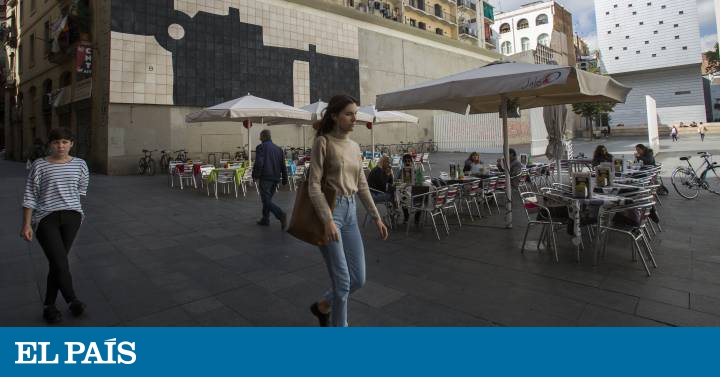One of the fundamental texts of the philosophy of the Spanish Transition has just been republished, in Castilian and Catalan:
La Cataluña ciudad
(Galaxia Gutenberg), by Eugenio Trías.
In it, the Barcelonan thinker maintains that the identity of a people, their own way of being, feeling and understanding the world does not reside in anthropological or ethnic features.
It is necessary to review, critically, the ideas of nation and country.
It must stop being understood in an essentialist key and recreate itself according to the current era;
namely: in terms of civility.
I'll explain right away.
Instead of
making a country
, he proposes
making a city
.
Instead of a narrow-minded historicist and anthropological nationalism, or a one-dimensional, eight-century concept of the nation, it prescribes conceiving of national identities, not in an ontological or abstract sense, but in terms of their incarnations in the city, in their cosmopolitan cities.
He considers it the only way to "develop all citizen energies, whatever their ideology and speech, their origin and their degree of miscegenation".
He is inspired, for this proposal, by important Spanish and Catalan thinkers: Maragall, D'Ors, Unamuno, who takes the idea of the city from Xènius: “the homeland is, first and foremost, the city, and the homeland is a means to civilization and not the end of it ”.
According to Trías, homeland in any other sense constitutes a worn and discredited concept in political philosophy.
Hence, today euphemisms are sought: country, people or nation, to clothe it with a secular and secular aura, and thus disguise the claim to sacralize and theologize it, and to eternalize or immortalize it as incorruptible.
The homeland is only legitimate - says Trías - if it is loved for its being (being is conceived as finite, being with a limit) and not in reference to the absolute or divine.
And that can only be achieved by redefining it - as opposed to all nationalism - as a city, as a cosmopolitan civility.
But it is also inspired by the great contemporary European philosophy: Hobbes's notion of a pact and, above all, that of Hegelian civil society.
This is the intermediate space that mediates between nature and the State: the individual's own sphere as an autonomous and free person.
It is in the modern city where the individual emancipates himself from the domain of the common, of gender, of the family, and achieves singular freedom.
And it does it through culture: hard work and acquiring training.
The city is the place of the community of shared culture and civilization that is won only through work and culture.
The city is the interstice between the state of nature and the political state: the space of pacts, where arms give way to labor and economic sacrifice, although, as Marx saw very well, it continues to be an area torn and conflictive by the economic class struggles.
Well, Trías says that it was Catalonia who, throughout the 20th century, embodied, within Spain, that synthesis between pactism and individualism.
And it was Barcelona that best materialized that metropolitan civility and cosmopolitan city of culture;
the one that most clearly abandoned the local, rural and village spirit.
Aerial view of Barcelona.
Joan Sanchez
Thanks to the cities –as second homes– the telluric and the homeland are abandoned –as D'Ors wanted–.
Thanks to them, citizens expanded in favor of the cosmopolitan, mestizo and global, since they mediate between what shelters the past and the ancestor (what a local sanctuary) and world exchange (what a global casino), although Trías conceives them –Unlike D'Ors– in the manner of Maragall and Unamuno: moral and supportive (today we would say, welfare states).
The city is, in effect, the mediation and synthesis between the global and international and the local homeland.
But Trías also gives it philosophical relevance.
In his work the idea of the city takes on a triple meaning.
City is, above all,
cosmopolis
, that is, a microcosm of techno-scientific civilization formed by what he called, brilliantly,
global minorities
.
Second,
city
is any system that is articulated on a backbone and driving idea that is manifested in its various sectors (neighborhoods and districts).
And every city is, thirdly, a depository, repository and reservoir of layers and strata, often intermixed and mestizo, of history and memory of all the people, populations and cultures that have built, reformed it throughout the ages. and inhabited.
Trías's analysis in this work provides another great originality of rabid topicality and validity: it figures the conflict between Catalonia and Spain, not in republicanism, not in the Civil War, not in Francoism, not in the pact of 78, but in the turn of the nineteenth century.
It is rooted in the fact that this civility, that spirit of a cosmopolitan city embodied in Barcelona - which today would be joined by other modern and mixed-race cities in Catalonia: Terrassa, Tarragona, L'Hospitalet, Girona ... - was prevented from infecting the rest of Spain, and was denied a central role in the Hispanic regeneration of the early twentieth century.
Catalonia could not –according to him– contribute, neither on the right nor on the left, to an effective Hispanic structuring.
Therefore, both parties had to settle for pactism, which turned Spain, throughout the 20th century, into “an unresolved lawsuit between a civil society without a State –Catalonia– and a traditional, archaic, authentic State of markedly unitarian character, and viscerally phobic with respect to all the autonomist regeneration process ”.
The consequence of this was sung: two visceral nationalisms emerged.
In Catalonia an essentialist patriotism was forged, while Spain failed to consummate, when it was playing –the first decades of the last century– a modern process of synthesis between homeland and cosmopolitan and international civility.
Thus, for Trías the differential fact of a society, of a nation –Catalonia, without going any further–, is never something anthropological;
It does not have to do with the ethnic, but with the cultural.
However, the idea of culture is always problematic because of its vagueness;
it requires an empirical guideline to determine it, hence the differential fact in the language is usually essen- tial.
Now, linguistic differences are, by definition, negative, reducing, impoverishing.
The differential fact, if it is something, must be positive: a set of ideas and values.
And these do not reside in language but in thought.
It is philosophy that must trace, in language, those cultural values and ideas that make up the identity and uniqueness of a nation.
For this reason, Trías sees it necessary to return to figures such as Jaume Balmes, Eugeni D'Ors, Joan Maragall or the thinkers of the Catalan Middle Ages.
Identity emerges from the ideas that a nationality consciously adds to the mere raw material of its people.
Arash Arjomandi
is a philosopher and professor at the EUSS-School of Engineering (UAB).
'The Catalonia city'
Author:
Eugenio Trías
Publisher:
Galaxia Gutenberg, 2020
Format:
Hardcover, 136 pages
Find it in your bookstore



/cloudfront-eu-central-1.images.arcpublishing.com/prisa/CAQ75OKMMBC7BORFCV6MOXDMWQ.jpg)
/cloudfront-eu-central-1.images.arcpublishing.com/prisa/7EFB3K7VHNAGJFB4NX3MANWHHA.jpg)










